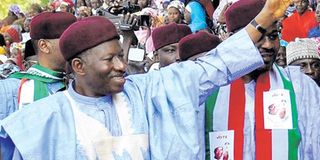Fears over repeat of Nigeria poll violence amid Boko Haram raids

Nigerian President and candidate of the ruling People’s Democratic Party (PDP) Goodluck Jonathan waves to supporters during a rally in Maiduguri on January 24, 2015. AFP PHOTO
What you need to know:
- In 2011, claims of rigging sparked rioting across the north, leaving some 800 people dead.
- Poll is a rematch between Goodluck Jonathan and former president Buhari.
MADAKIYA, Nigeria, Wednesday
All that’s left of the Muslim neighbourhood in Madakiya, in Nigeria’s northwestern Kaduna state, are decomposing bricks and graffiti-covered walls standing in fields of charred grass.
Muslims and Christians once lived together in the village but Madakiya’s entire Muslim population fled to a nearby town in rioting after the 2011 presidential election.
With Nigerians set to vote again next month, people in the religiously mixed state are wary of a repeat after houses were looted, markets burned, and people killed in the streets.
“I don’t think something of that nature will happen but you cannot trust the politicians,” said Luka Awage, a representative of the district head in Madakiya, which lies in the southeast of the state.
“What happened in 2011 was very, very unfortunate. And we don’t pray for that.”
This year’s election on February 14 is on paper a rematch between President Goodluck Jonathan and Muhammadu Buhari, Nigeria’s former military ruler.
But this year, Buhari is running under the banner of the All Progressives Congress (APC) coalition, which is believed to pose the biggest challenge to Jonathan’s Peoples Democratic Party (PDP) in years.
The PDP has won every election in Nigeria since the country returned to democracy in 1999. Political clout in Nigeria often breaks down along religious or ethnic lines.
Jonathan is expected to do well in the mainly Christian south while Buhari is likely to win most of the states in the Muslim-majority north and the commercial capital Lagos, an opposition stronghold.
The southern half of Kaduna State is dominated by churches and the north with mosques, with the religious mix a potential powder keg for violence.
In 2011, it exploded. Claims of rigging sparked rioting across the north, leaving some 800 people dead, according to Human Rights Watch.
In the state capital Kaduna city, mobs bludgeoned to death Muslims and Christians found on the wrong side of the tracks; mosques and churches were torched; motorists were dragged out of cars and killed.
In Zonkwa, a town near Madakiya, HRW reported that 311 Muslims were buried in a mass grave.
Fighting in Kafanchan, across a bridge from Madakiya, erupted shortly after Jonathan’s win was announced. People from both communities lay dead and the main market was razed.
Christians who still live in Madakiya and Muslims from the village who now live in Kafanchan dispute the events of 2011.
Mr Isa Musa still carries a bullet in his chest from the night he was forced to flee to Kafanchan.
Before the attack, Muslims and Christians lived peacefully, he said.
Philip Jagaba, a Christian whose house abuts the ruined Muslim quarter, said people started attacking Muslim homes at night after Jonathan was declared the winner.
Meanwhile, Amnesty International on Wednesday claimed that Nigeria’s military top brass were warned of brutal Boko Haram attacks on the northeast towns of Baga and Monguno but failed take action.
The January 3 onslaught against Baga is feared to have killed hundreds, if not more, and destroyed thousands of homes, while the takeover of Monguno last weekend was seen as a major setback for the security forces.
Amnesty said it received information from senior military officers and other sources indicating that defence officials were told about Boko Haram’s plans to attack both towns but did not act on requests to send reinforcements.
“It is clear from this evidence that Nigeria’s military leadership woefully and repeatedly failed in their duty to protect civilians of Baga and Monguno despite repeated warnings about an impending threat posed by Boko Haram,” said Amnesty’s Africa director Netsanet Belay.
On Baga, Amnesty said troops in the town in extreme north of Borno state reported a build-up of insurgent fighters in the area before the attack.





